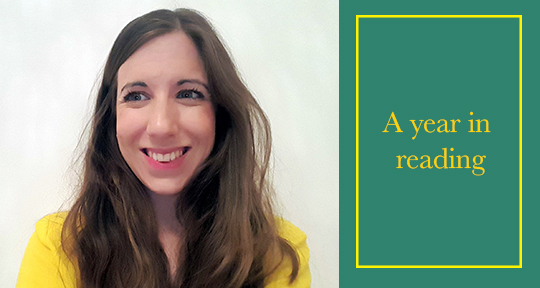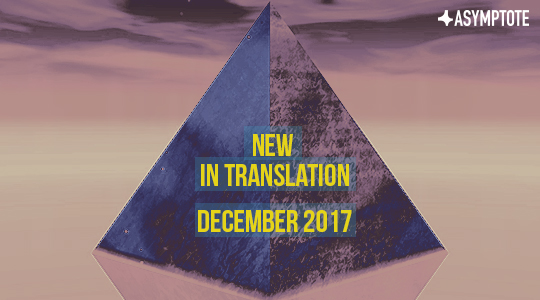Language: Japanese
Asymptote Podcast: Language and Dance (Part II)

Sawako Nakayasu on translating the founder of Butoh, a Japanese dance known for its darkness and contorted movements
Translation Tuesday: Three stories by Ryūnosuke Akutagawa
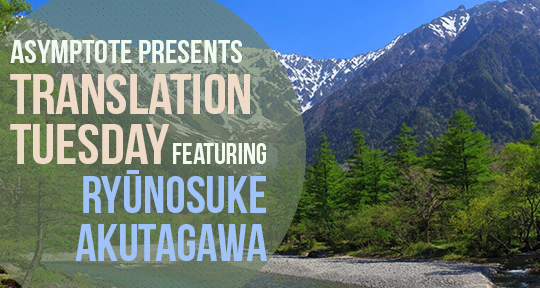
As I continued to stare at the drifting peaks, a peculiar scene from my past came to mind.
Today we bring you three enigmatic pieces by “the father of the Japanese short story.” You probably know Ryūnosuke Akutagawa without realizing it—one of his short stories served as the basis for Akira Kurosawa’s classic film Rashōmon. Each of these tales brings a quick punch of emotion, leaving an impression on the reader not unlike that of microfiction.
Sennin[1]
There was once a sennin who worked as a jurist in O Town near Lake Biwa. His favorite pastime, more than anything else, was collecting gourds. Stored inside a giant closet on the upper floor of his rented home was his vast collection hanging from nails hammered into the posts and lintels.
Three years had gone by, when, one day, the sennin received a notice of transfer from the government. He was to relocate forthwith to his new post in H City. He made arrangements for all of his furniture and belongings except for his gourds, of which he had amassed over two hundred. He had no idea how to go about moving them, and he refused to part with a single one.
In Review: The Emissary by Yoko Tawada
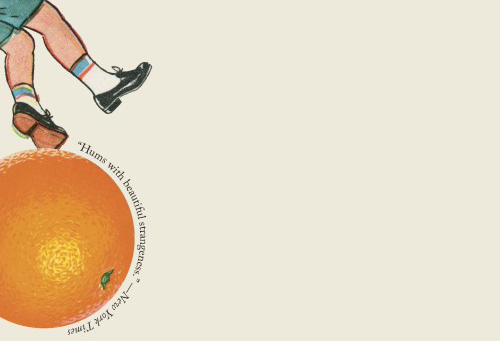
In The Emissary, the reader feels a sense of a hope, a beacon glowing in the grim reality of post-disaster Japan.
The Emissary by Yoko Tawada, translated from the Japanese by Margaret Mitsutani, New Directions, 2018
Reviewed by Ben Saff, Responsive Layout Designer
If you have ever walked into a house of mirrors, you may remember the uncomfortable feeling of seeing your reflection staring back at you. Your forehead is ten times its normal size, your nose is reduced to a pin point, and your limbs appear like wavy ribbons upon the curving surface of the mirrors. What’s disturbing about the reflection is that it still kind of looks like you—it’s a believable image. In The Emissary (originally published as Kentōshi (献灯使)), Yoko Tawada conjures this exact effect, presenting an image of her native country of Japan that is nightmarish, surreal, and just a little too possible for comfort.
Section Editors’ Highlights: Spring 2018
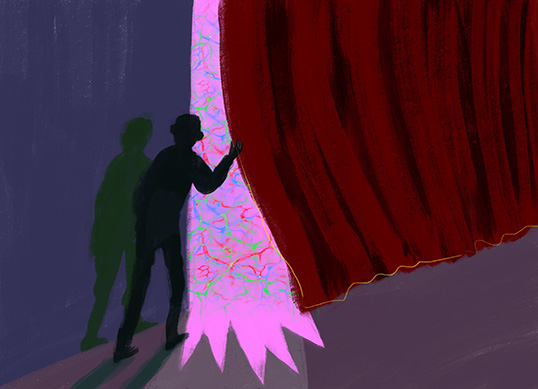
Our Section Editors pick their favorite pieces from the Spring 2018 issue!
The brand new Spring 2018 issue of Asymptote Journal is almost one week old and we are still enjoying this diverse set of writing. Today, our section editors share highlights from their respective sections.
The phrase “Once upon an animal” has been circulating in me for months, ever since I first read Brent Armendinger’s translations of the Argentine poet Néstor Perlongher. The familiar fairy tale opening, ”Once upon a . . .” asks one to think of a moment, distant, in time, when such and such happened—happened miraculously or cruelly and from which one might take (dis)comfort or knowledge of some, perhaps universal, human frailty or courage. But Perlongher/Armendinger replace “time” with “animal”—a body. Against time, in its very absence, we’re asked to look at this body, which is in anguish, now. Perhaps now too is in anguish.
I can’t read Spanish, but the translation suggests a poetry of complex syntactical structures and lexical shock:
Once upon an animal fugitive and fossil, but its felonies
betrayed the same sense of petals
in whose gums it stank, tangled, the anguish
impaled, like a young invader
A feat of translation, no doubt. Armendinger writes that “this intensely embodied and unapologetically queer language” is what drew him to Perlongher, and now we too are drawn in.
Perlongher was a founder of the Frente de Liberación Homosexual Argentino, agitated against the military dictatorship, and, as an anthropologist, wrote about sex workers, and gay and transgender subcultures. All this—writing, work, and play—was perhaps yet another way of saying: “Be still, death:”; “in the steam of that / eruption: ruptured play, rose / the lamé.”
—Aditi Machado, Poetry Editor
What’s New with the Crew? A Monthly Update

Check in with the Asymptote crew's literary achievements!
We have such an amazing group of creative people over here at Asymptote. Check out some of our recent news and stay tuned for more of the international literature you love!
Poetry Editor Aditi Machado published a micro-review of Hirato Renkichi’s Spiral Staircase (translated by Sho Sugita) in The Kenyon Review.
Copy-editor Anna Aresi‘s Italian translation of Ewa Chrusciel’s poems from her new book, Of Annunciations (Omnidawn, 2017), appeared in El Ghibli, the first Italian journal of migrant literature.
Assistant Blog Editor David Smith presented original research on the life and work of Sherman Adams (an African-American activist, journalist, and author who migrated to Sweden in the 1960s) at the Lost Southern Voices festival in Atlanta on March 24. He will also be reading a paper at the Society for the Advancement of Scandinavian Studies conference in Los Angeles in May.
Translation Tuesday: “Finger” by Toshirō Sasaki
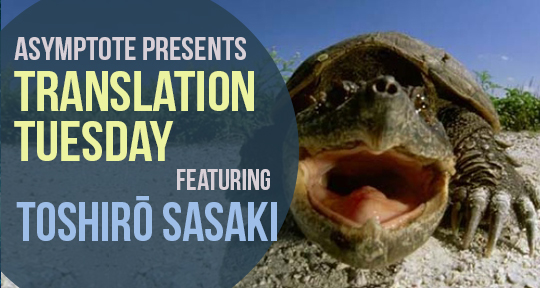
"The girl stood there, a large pair of sharp pruning shears in her right hand, waiting for the turtle to stick its head out."
In this story by Toshirō Sasaki, a young woman in pre-war Japan buys a turtle and unintentionally contributes to a man’s arrest, opening up questions about class, poverty, and criminality in a nation that is beginning to rapidly modernise.
1.
At the black markets in Ginza a girl bought a soft-shell turtle. She put it inside her large crocodile-leather opera bag and set out on the Ginza streets. It was early evening, and the district was filled with people bustling about. She pushed her way through the crowd, heading for the Owari-chō tram stop. Customers gathered impatiently at the opening street stalls. Red, blue, and violet rays of light swayed all around. The chaotic sounds of footsteps echoed.
“Excuse me! Young miss!”
Feeling that someone must have been calling out to her, the girl came to a stop. From her shoulder to the end of the street, countless shoulders rubbed together. Grey summer overcoats and bright green silk crepes. Spring jackets the color of matcha. Brand new straw hats. A rich fragrance of sweets. And then the refreshing chill of the night air, washing away the mood of afternoon.
It was an illusion. No one had been calling to her at all. Only a pale man with a long face, a grey hunting cap pulled down over his eyes and light brown jacket wrapped around his body, his shoulder touching hers, moved towards her.
Weekly Dispatches from the Frontlines of World Literature

Our weekly roundup of literary news brings us to Morocco, Hong Kong, and the United States.
We are back with the latest from around the world! This week we hear about Morocco, Hong Kong, and the United States. Enjoy!
Hodna Nuernberg, Editor-at-Large, reporting from Morocco
Some seven hundred exhibitors from Morocco and around the world descended on Casablanca for the Salon international de l’edition et du livre, which took place from February 9-18. Half open-air souk (rumor had it that one of the ambulatory vendors went so far as to offer women’s panties for sale!), half oasis of high culture, the book fair counted over 125,000 titles from forty-five different countries. Egypt, this year’s guest of honor, accounted for nearly fifteen percent of the titles on offer alone, and managed to ruffle more than a few feathers when an Egyptian publisher was allegedly caught displaying a book (A Brief History of Africa) whose cover featured a map of the continent depicting a “mutilated” Morocco—the disputed territory of the Western Sahara appearing as an independent nation under the Polisario flag. The presence of the book was firmly denied by the Ministry of Culture.
What’s New in Translation: January 2018
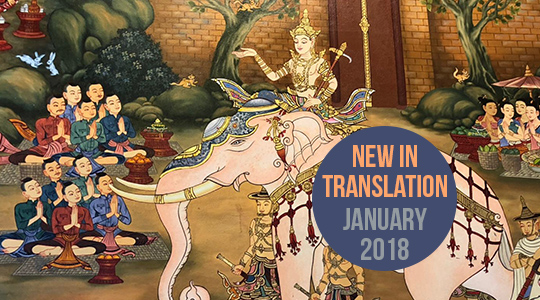
The new year kicks off with new releases from Japan, Germany, and Italy.
Every month, our staff members pick three notable new releases in world literature to review. The first month of 2018 brings us short fiction from Japan and novels from Germany and Italy.
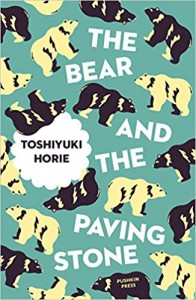
The Bear and the Paving Stone by Toshiyuki Horie, translated from the Japanese by Geraint Howells, Pushkin Press
Reviewed by Theophilus Kwek, Editor-at-Large for Singapore
Mention ‘contemporary Japanese fiction’ to the average reader and bestselling names like Haruki Murakami, Ruth Ozeki, and Keigo Higashino might come to mind; or indeed last year’s Nobel laureate, the British novelist Kazuo Ishiguro. From that perspective, at least, Toshiyuki Horie can be considered one of the modern Japanese canon’s best-kept secrets, happily resurfaced for an Anglophone audience by the ever-intrepid Pushkin Press. A critic, translator, and professor of literature, Horie has garnered numerous accolades for his fiction and essays, and is also—as the three novellas collected here reveal—a masterly prose stylist, a ruthlessly effective narrator, and a seasoned traveller between the real and imagined geographies of experience and history, dream and memoir, and past and present.
The first and longest section of the volume contains Horie’s novella “The Bear and the Paving Stone,” which won the Akutagawa Prize in 2001, and lends this volume its title. The tale opens in a strange, allegorical dream-sequence that ends just as abruptly when the narrator wakes, alone, in a rural farmhouse in Normandy. Drawing on Horie’s own time as a graduate student at the Sorbonne, the story unfolds with exquisite pacing into a long-awaited reunion between two unlikely college pals: the narrator (then a student from Japan, now a professional translator) and Yann, a free-spirited, petánque-playing photographer. As they embark on a breakneck drive to see the sun set over Mont St Michel from Yann’s favourite spot on the coast, we are plunged as if into another dream: this time, comprising the layered narratives of French intellectual history, the Holocaust and its aftershocks, and a post-modern, international friendship. Ghostly historical figures such as Émile Littré, Jorge Semprún, and Bruno Bettelheim haunt these pages with a sense of driving, almost teleological purpose, but the two friends’ conversation somehow remains light, and movingly human, throughout.
2017 was a fantastic year for books, but there’s still so much more we want to share before we enter the New Year! This month, our team of editors review two new books from China and Japan—each of them special in their own way. Dive in!
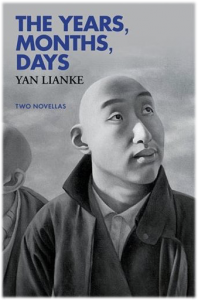
The Years, Months, Days by Yan Lianke, translated from the Chinese by Carlos Rojas, Vintage (UK)
Reviewed by Dylan Suher, Contributing Editor
Released years after the publication of the original, translations benefit from historical hindsight. Although the two novellas contained within The Years, Months, Days (Grove Atlantic, December 2017) are the latest of Yan Lianke’s works to be translated into English, they were originally published in 1997 (The Years, Months, Days) and 2001 (Marrow, originally titled Balou Mountain Songs 耙耧天歌), just before the string of novels upon which Yan’s reputation now rests: Hard Like Water (2001), Lenin’s Kisses (2004), Dream of Ding Village (2005) and Four Books (2011). Read in retrospect, these novellas represent a critical point in the evolution of Yan’s aesthetic. In both, we can see Yan learning how to best use his preferred technique of primordial allegory, painted with a broad Fauvist brush. Carlos Rojas tends to smooth out and harmonize Yan’s expressive phrasing, but the credit (or blame) for the rough symbolist feel of a metaphor like time that “rushes past their interlocked gazes like a herd of horses” should all go to Yan.
Translator Profile: Jennifer Scappettone
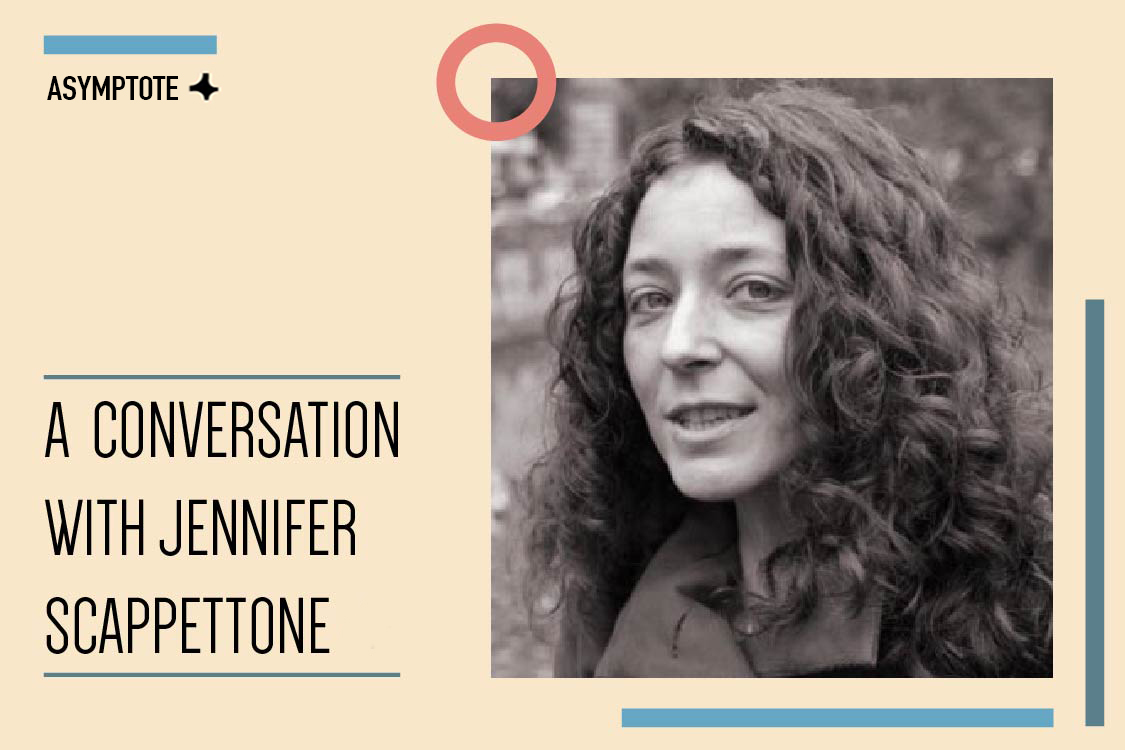
The notion of a unitary, homogenous, and monolingual “America” is as much an alternative fact as Spicer’s attendance numbers at the inauguration.
Former Asymptote blog editor Allegra Rosenbaum interviews translator and scholar Jennifer Scappettone, whose profile appeared in our Winter 2016 issue. Her translation of Italian poet Milli Graffi was featured on the Asymptote blog last week and her translation of F. T. Marinetti’s futurist poetry appeared in our Spring 2016 issue.
Who are you? What do you translate? (This is just a preliminary question! To be taken with an existential grain of salt.)
I am a poet and scholar of American and Italian nationalities who grew up in New York, across the street from a highly toxic landfill redolent of the family’s ancestral zone outside of Naples (laced with illegal poisonous dumps). I translate Fascists and anti-Fascists; Italian feminists and a single notorious misogynist; inheritors of Futurism and the historical avant-garde; and contemporary poets who are attempting to grapple with the millennial burden of the “Italian” language by channeling or annulling voices from Saint Francis through autonomia.




